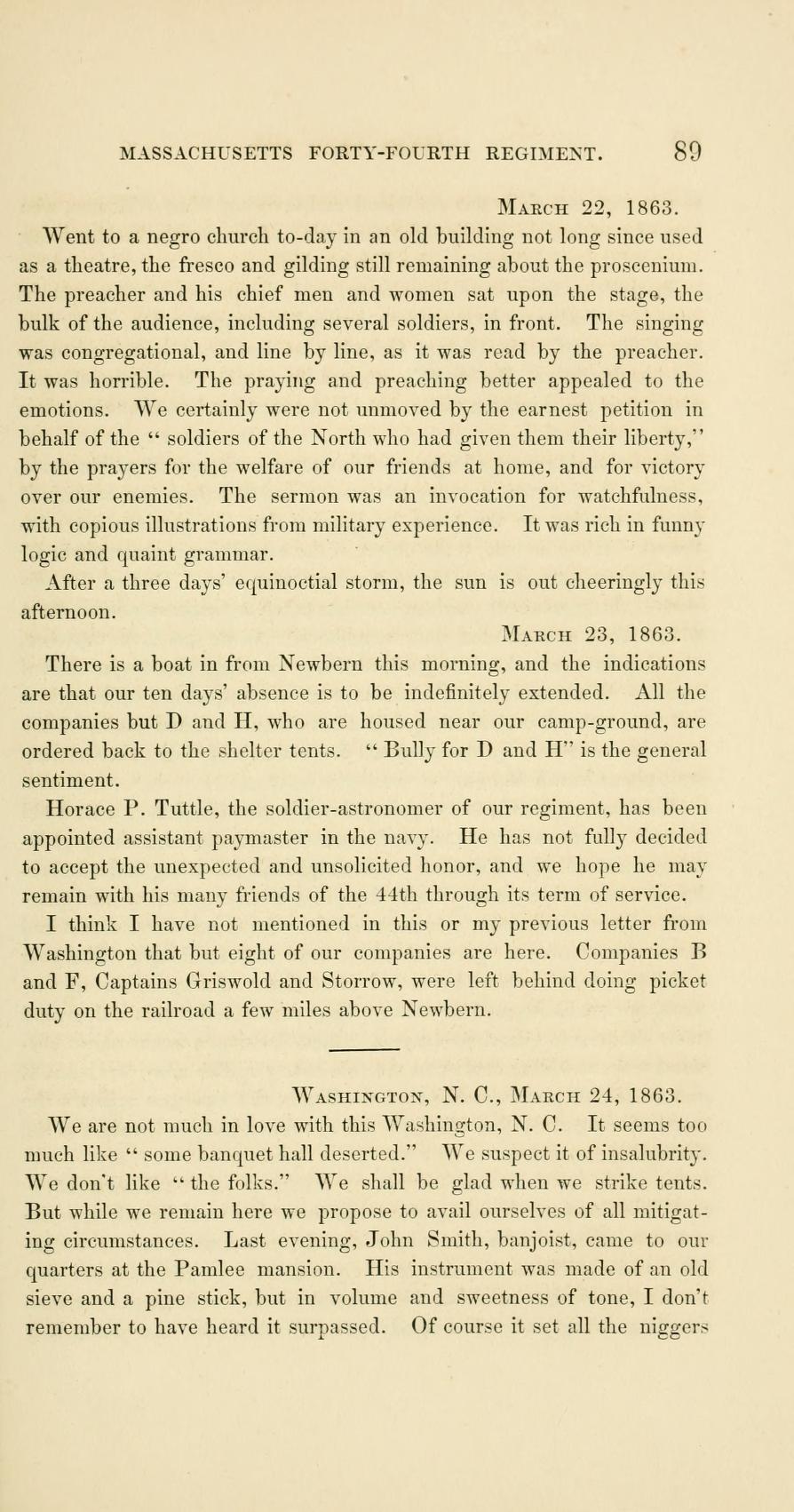Item description: Published letter, dated 24 March 1863, written by Corporal Zenas T. Haines, Company D, 44th Massachusetts Infantry Regiment. The letter is an excerpt from Haines’ account, Letters from the Forty-Fourth Regiment M.V.M.: A Record of the Experience of a Nine Months’ Regiment in the Department of North Carolina in 1862-3 (published in Boston in 1863).
[Transcription available below images.]
Item citation: From, Letters from the Forty-Fourth Regiment M.V.M.: A Record of the Experience of a Nine Months’ Regiment in the Department of North Carolina in 1862-3, by Zenas T. Haines, Boston: Printed at the Herald Job Office, 1863. Catalog Number: C970.742 H15, North Carolina Collection, University of North Carolina at Chapel Hill.
Item transcription:
Washington, N.C., March 24, 1863.
We are not much in love with this Washington, N.C. It seems too much like “some banquet hall deserted.” We suspect it of insalubrity. We don’t like “the folks.” We shall be glad when we strike tents. But while we remain here we propose to avail ourselves of all mitigating circumstances. Last evening, John Smith, banjoist, came to our quarters at the Pamlee mansion. His instrument was made of an old sieve and a pine stick, but in volume and sweetness of tone, I don’t remember to have heard it surpassed. Of course it set all the niggers to dancing, especially our old friend and favorite, West Williams, who earned new laurels in the light fantastic. John Smith, besides being a splendid banjoist, has a voice like a robin.
To-day the lines have been open, and the women of the suburbs have been thronging into town to buy a little sugar, coffee, snuff, &c., especially snuff. Our friend Grist has at last been permitted to go outside the lines. He doesn’t attempt to disguise a degree of sympathy with the Southern cause, but his outward conduct towards us has been gentlemanly.
Contrabands report a large rebel force (seven thousand) within seven miles of Washington, one day last week; and that they were restrained from advancing on the place by hearing that the garrison was reinforced. If this is true, “the object of the expedition is accomplished,” and we may expect to return to Newbern very soon. One of the officers of the permanent garrison here has taken a Southern woman for a wife. They are our next door neighbors. As we see them together, planting flowers in the door-yard, we fancy we might become reconciled even to Washington, N.C., under such circumstances. There is a call now upon the gardening skill of the regiment, and some of the boys have voluntarily ornamented the vicinity of their shelter-tents with plants in full bloom.
Washington, N.C., in its palmy days, is described as “a hard old place.” It was a slave market of some consequence, and the population consumed a good deal of “ardent spirits,” according to the authority of a venerable “aunty” who lives in a cabin attached to our quarters. Street duels were a common affair. An election was considered tame without two or three attendant rows and stabbings. The poor white people left behind here, and even those of respectable appearance, are unable to read or write. They considered it unlawful to send their children to school – so says a decent looking woman whose husband is an unwilling soldier in the rebel army. The more we learn of the despicable social condition of the South, the stronger appears the need of the purification which, in the Providence of God, comes of the fire and the sword.



